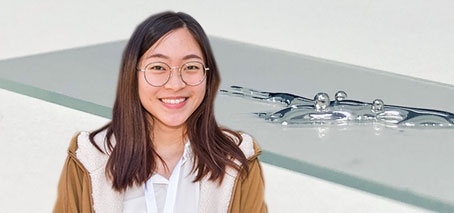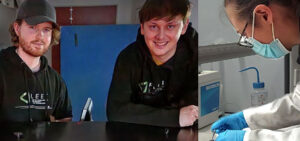
The team at RMIT: project leader PhD candidate Patjaree Aukarasereenont and supervisor Dr Torben Daeneke
2D oxide-based LED encapsulation extending device lifetime
FLEET translation funding is supporting the next step in a liquid-metal printing application with significant commercial promise, in a project being led by RMIT PhD candidate Patjaree Aukarasereenont.
Light-emitting diodes (LEDs) play a crucial role in modern society – from mobile phones to LED billboards and home lighting, LEDs are ubiquitous.
There are, however, delicate components sitting inside each LED unit that need to be protected in a dry and oxygen free environment. Typically, the lifespan of LEDs is limited by the quality of their encapsulation technology, and device damage occurs when water and oxygen inevitably defuse through the epoxy polymer-based barriers.

Oxidation of the LED package causes degradation in light output, extra heating, and change in colour of the light, compromising device life and energy consumption. After use (right), a white light LED package shows clear oxidation.
“Our work provides a way to enhance the quality of these encapsulation materials by adding carefully-tailored 2D metal oxides as gas barriers,” says Patjaree Aukarasereenont. “This prevents device degradation, and prolongs lifespan, with both commercial and environmental benefits”.
Ultrathin aluminium-oxide (Al2O3) synthesised through liquid metal-based techniques has showed potential in mechanical enhancement of an epoxy polymer in previous studies.1,2
In the new work being funded by the FLEET Translation Program, two-dimensional Al2O3 will be isolated via the same fundamental process, and will be further explored as a moisture barrier for LEDs by blending with the polymer.
“If we are successful, we should be able to attract the attention of LED industries, as well as other applications that also need transparent polymer encapsulation with good gas barrier properties, such as food packaging companies,” says supervisor Dr Torben Daeneke (also at RMIT).
“It is also exciting to see the materials synthesised in our lab being upscaled and practically used,” says Patjaree.
FLEET’s Translation Program identifies Centre members with the desire and capability to translate their research, and shepherds those projects towards commercialisation via funded HDR translation stipend, Translation Fellowships, and project facilitation funding.




